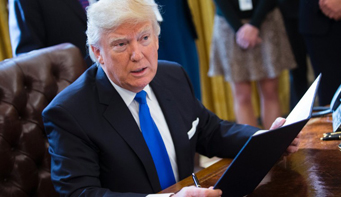Washington, Jan 27: President Donald Trump is seeking to impose a 20 per cent tax on imports from countries which has a trade deficit with the US like Mexico in order to finance the construction of a border wall along its southern border, the White House said. This is one of the way to pay for the wall that the US is planning to construct along the US-Mexico border.
 However the proposal is currently only for Mexico, White House Press Secretary Sean Spicer told reporters travelling with the Trump from Philadelphia to Washington DC abroad Air Force One. "When you look at the plan that's taking shape now, using comprehensive tax reform as a means to tax imports from countries that we have a trade deficit from, like Mexico," Spicer said.
However the proposal is currently only for Mexico, White House Press Secretary Sean Spicer told reporters travelling with the Trump from Philadelphia to Washington DC abroad Air Force One. "When you look at the plan that's taking shape now, using comprehensive tax reform as a means to tax imports from countries that we have a trade deficit from, like Mexico," Spicer said.
"If you tax that USD 50 billion at 20 per cent of imports, which is by the way a practice that 160 other countries do -– right now, our country's policy is to tax exports and let imports flow freely in, which is ridiculous. By doing it that way we can do USD 10 billion a year and easily pay for the wall just through that mechanism alone," Spicer said.
"Right now we are focused on Mexico, but I think as we look comprehensively at our trade situation and countries that we have a deficit for, this is something the president has been talking about holistically," he said. "He has talked about a border tax. In particular companies that move out, ship things back in. But in this case, this really handles, is focused more on the immigration piece," Spicer said.
"Remember, keep in mind there are 160 other countries that do just this. We are one of the only major countries, in fact probably the only major country that doesn't treat imports this way," Spicer said. "In fact, we currently tax exports, not imports. This gets us in line frankly with the policies that the other countries around the world treat our products," he said.
"If you think about what a border tax on imports from countries like Mexico that we have a huge trade deficit does, that's really going to provide the funding," he added.
"But the other net positive that you have to realise is that through the wall, not only do we secure our border but I think we are going to save additional money that we would have had to spend on tracking down illegal immigrants and on immigration," Spicer said making a strong case for a physical barrier across the US-Mexico border.
Meanwhile, Spicer said the 20 per cent tax plan to be imposed on imports from countries with trade deficit like Mexico was in early stages and nothing has been finalised yet. The tax plan is in its "early stages," Spicer said. The President was really excited to see the level of support that both houses showed for his nominees, for his plan, for his desire to put America's security first," he said. Spicer said the President is still talking with the Republican leadership in the Congress.
"I don't think our job right now is to roll something out and or be prescriptive, it's to show that there are ways the wall can be paid for. Full stop," Spicer said in response to a question. "The idea was, there have been questions about how the President could pay for the wall. And the idea that, one idea through comprehensive tax reform is that there could be this idea that Speaker (Paul) Ryan and others have floated that through tax reform you could actually look at imports with countries that we have a trade deficit for, that can generate revenue," Spicer said.
"The idea is to show that generating revenue for the wall is not as difficult as some might have suggested. One measure alone could do this. So as we move forward the idea today wasn't rolling it out or being prescriptive or announce anything, it's to say hey look, it's not that hard to do," he said. Spicer said there is nothing to be rolled out yet.
"There's nothing to roll out so the idea of asking for details on something, we're not there yet. It could be a multitude of things," he said. "Instead of 20 per cent it could be 18, it could be five. But the idea is to say that for all the 'how could this ever happen,' it's to say 'okay, here's one idea that gets it done really easy. That's the idea, that there is a way that easily does this," Spicer said.
"You can do things in a very WTO-compliant way, but I'm not here to roll out a policy... Hypothetically yes, there are several things you can do and be compliant. You can say any country but if you look at just Mexico alone you can do that very easily," he added.






Comments
Add new comment